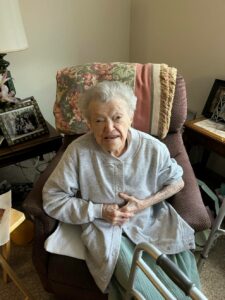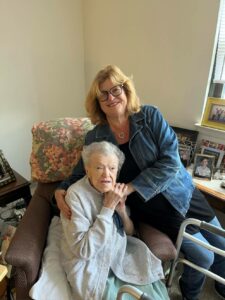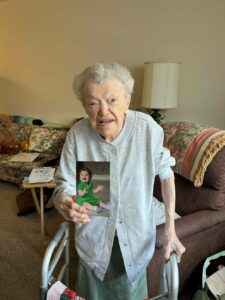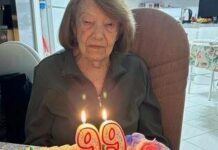
She’s 5-feet tall. Her legs are as thin as sticks. She can barely get up out of her recliner. She has only left her small home in the Holy Redeemer Lafayette retirement community a few times in the last decade.
But after surviving Auschwitz and then six years of tuberculosis, Doris Bell is still here. She turned 100 on Sept. 15. For her birthday, her family took her out to New Wild Ginger, a Chinese restaurant in Huntington Valley.
Her two children, Steven Bell and Judy Kratchman, four grandchildren and eight great-grandchildren were there. Steven Bell said they talked about how none of them would be if it wasn’t for Doris Bell.
“She was a five-foot, 100-pound woman that was barely living when they rescued her,” the son said.
As the son told part of his mother’s story while sitting on a couch in her home, the mother interjected from across the room.
“I was a good stealer. I stole potatoes. And I ate it,” she said. “In Auschwitz, I went in through the kitchen window, grabbed what I wanted and went out.”
“I survived,” she added.
Here’s how.
Childhood
Bell grew up in a “nice” Polish town in a “nice apartment” with her parents, Zindel and Rifka Samelson, and her siblings, brother Felix and sister Lola. She went to school until seventh grade in 1938. Her father owned a shoe store.
“There was food on the table. And I was clothed nice,” Bell told her granddaughters Taryn Bell, Dana Kratchman and Lauren Bell in 2012 for a school project.
The young girl heard that there was going to be a war. And then one morning, she saw airplanes flying overheard and a woman screaming from her balcony that the Germans were occupying Poland.
“And this is the day it started,” Bell said to her granddaughters.

Months later, the Germans told them they needed to leave their home and move to the Jewish ghetto. The Samelsons lived in a single room with 15 people. They survived on weekly rations of potatoes, bread and soup.
Then one day, the soldiers took them to a 150-year-old church and separated people according to who could work and who couldn’t. Bell ended up in the Blizyn labor camp. Her mother was taken somewhere else.
“That was the last time I saw my mother,” she told her grandchildren.
Auschwitz
After a year in Blizyn, Bell was taken to Auschwitz. Her brother Felix worked on the men’s side of the camp for the Germans. In return, he got an assortment of food each day.
In the mornings, the siblings would walk by each other on the way to their respective workstations. The brother would sneak cigarettes, a piece of bread and a little sugar to his sister.
By January 1945, the Russians were closing in on Auschwitz, so the Germans made their prisoners walk for five days to the Bergen-Belsen concentration camp. Bell stole shoes for the journey. But they were two left shoes. And they were men’s shoes.
“I wore them the whole time,” she told her granddaughters. “I stuck newspapers in them.”
Bergen-Belsen
Early at Bergen-Belsen, Bell “didn’t feel alright,” she recalled. She stopped eating. But she does remember parachuters swooping down and then learning that the war was finished.
She fell into a coma and ended up in a hospital for three weeks. Bell recalls doctors examining her and saying she’s not right.
Then, they sent her to Sweden.
Sweden
Bell had tuberculosis. She was in Sweden by herself in a sanitarium. One day, the doctor told her he couldn’t heal the hole in her lung. He had to take half of the lung out.

But it was a mistake. There was another Dora Samelson in the same sanitarium. To heal the lung after that, they had to use a needle to inject air into it every three weeks and then flatten the lungs.
The survivor spent six years in Sweden. But then she got immigration papers to go to the United States. Felix paid for the journey.
United States
Bell lived with Felix for 10 months. But then his wife, Kati, connected her to a man named Jerry Bell. He was a friend of one of Kati’s friends.
“We liked each other and got married,” Bell said to her grandkids.
Felix paid for the wedding.
Today
Bell may not be able to go out much, but she is surrounded by family. Her husband died 29 years ago. But her children visit at least once a week. Pictures of her grandchildren and great-grandchildren line the shelves.
The matriarch mentions that she told her grandson Michael, Judy’s son, to go to dental school. Now he’s a dentist. She talks about her son’s career success. (Steven Bell is the CFO for Biocoat Inc., a medical equipment company in Horsham.)
And she picks up a picture of her youngest great-grandchild, a girl named Harlow, and says, “She’s such a cutie.”






